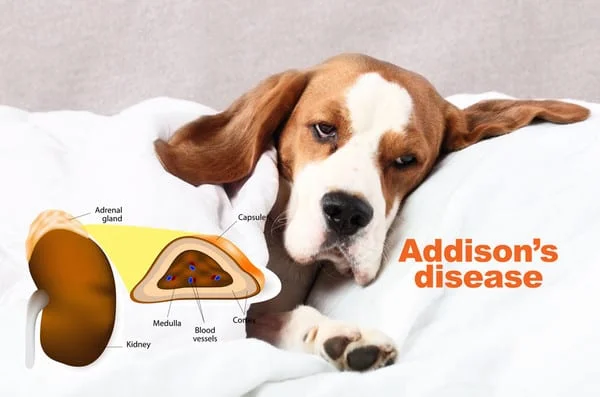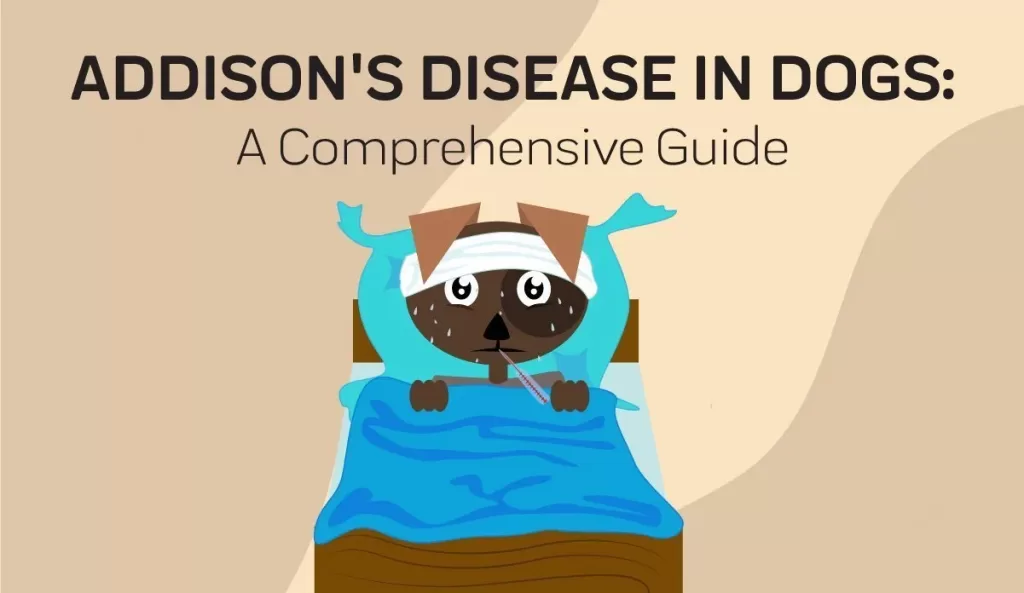Addison’s disease, also known as hypoadrenocorticism, is a serious condition in dogs. It occurs when the adrenal glands fail to produce essential hormones, particularly aldosterone and cortisol. These hormones play a crucial role in regulating various internal organs and body systems. Without them, a dog’s health deteriorates, leading to severe complications and even death.
Table of Contents
Causes of Addison’s Disease
Autoimmune Process
In many cases, the exact cause of Addison’s disease remains unknown. However, veterinarians suspect that most cases result from an autoimmune process that destroys adrenal tissue. This immune response leads to insufficient hormone production.
Other Possible Causes
- Adrenal Gland Destruction: Adrenal tissue can be destroyed due to various factors.
- Metastatic Tumors: Tumors can interfere with adrenal function.
- Hemorrhage and Infarction: Restricted blood flow can cause tissue death.
- Granulomatous Disease: Inflammatory conditions affecting the adrenal glands.
- Adrenolytic Agents: Drugs like mitotane that halt hormone production.
- Enzyme Inhibitors: Medications like trilostane that affect adrenal enzymes.
Symptoms and Diagnosis of Addison’s Disease

The Great Imitator
Addison’s disease is challenging to diagnose because its symptoms are diverse. Dogs may experience:
- Recurrent bouts of gastroenteritis (inflammation of the stomach and intestines).
- Poor appetite and gradual weight loss.
- Inability to respond appropriately to stress.
It’s essential to note that symptoms may vary over time.
Breeds Predisposed to Addison’s Disease
Certain breeds are more susceptible to this condition:
- Standard Poodles
- West Highland White Terriers
- Great Danes
- Bearded Collies
- Portuguese Water Dogs
- Nova Scotia Duck Tolling Retrievers
- Soft Coated Wheaten Terriers
Treatment and Management

Hormone Replacement Therapy (HRT)
- Purpose: The cornerstone of managing Addison’s disease is to replace the deficient hormones—aldosterone and cortisol—that the adrenal glands no longer produce adequately.
- Synthetic Hormones Used:
- Fludrocortisone:
- Function: Acts as a synthetic aldosterone replacement.
- Role: Helps regulate sodium and potassium levels, maintain blood pressure, and balance bodily fluids.
- Administration: Typically given once daily.
- Prednisolone:
- Function: Serves as a synthetic cortisol replacement.
- Role: Influences metabolism, immune function, and stress response.
- Administration: Usually administered twice daily.
- Fludrocortisone:
Also Read: Best ways to deal with Hairballs in dogs
Medication Monitoring
- Importance: Regular monitoring ensures that hormone levels remain within the optimal range.
- Blood Tests:
- Frequency: Initially, frequent blood tests are necessary to fine-tune the dosage.
- Adjustments: Dosages may need modification based on test results.
- Balancing Act: Finding the right balance is crucial—too little hormone can lead to symptoms, while too much can cause side effects.
Emergency Situations: Recognizing and Managing Crises
- Addisonian Crisis:
- Definition: A life-threatening situation resulting from acute adrenal insufficiency.
- Triggers: Stress, illness, trauma, or sudden withdrawal of medications.
- Symptoms:
- Weakness
- Collapse
- Vomiting
- Diarrhea
- Dehydration
- Low Blood Pressure
- Immediate Action:
- Emergency Vet Visit: Seek immediate veterinary attention.
- Intravenous Fluids: Rehydrate the dog.
- Corticosteroids: Administer intravenous or intramuscular corticosteroids (e.g., dexamethasone).
- Electrolyte Correction: Address imbalances (especially low sodium).
Remember, close collaboration with your veterinarian is essential for successful management. Regular check-ups, adherence to medication schedules, and vigilance during emergencies will help your dog lead a fulfilling life despite Addison’s disease.
Preventive Measures
1. Regular Veterinary Check-ups: Routine visits to your veterinarian are crucial for maintaining your pet’s health. Regular check-ups allow early detection of any underlying issues, including Addison’s Disease. During these visits, your vet will assess your pet’s overall well-being, monitor vital signs, and perform necessary tests. Early identification of symptoms can lead to timely intervention and better management of the disease.
2. Early Detection and Monitoring: Vigilance is key when it comes to Addison’s Disease. Be observant of any changes in your pet’s behavior, appetite, or energy levels. Common signs include lethargy, vomiting, diarrhea, and weight loss. If you notice any of these symptoms, seek veterinary attention promptly. Timely diagnosis ensures that appropriate treatment can be initiated, preventing complications and improving your pet’s quality of life.
3. Stress Management: Reducing Stressors: Stress can exacerbate Addison’s Disease symptoms. Minimize stressors in your pet’s environment by providing a calm and stable atmosphere. Avoid sudden changes, such as disruptions in routine, loud noises, or unfamiliar surroundings. Additionally, consider stress-reducing techniques, such as gentle handling, soothing music, and positive reinforcement. A stress-free environment promotes overall well-being and supports your pet’s health.
Remember, proactive measures play a crucial role in preventing and managing Addison’s Disease. By following these guidelines, you can enhance your pet’s quality of life and ensure their well-being.
Living with a Dog with Addison’s Disease
When caring for a dog with Addison’s disease, creating a safe and supportive environment is crucial. Here’s how you can ensure your furry companion thrives despite this condition:
- Safe Environment:
- Minimizing Risks: Remove potential hazards from your home. Keep medications, toxic plants, and harmful substances out of reach. Provide a comfortable resting area away from extreme temperatures.
- Stability: Dogs with Addison’s are sensitive to stress. Maintain a consistent routine to minimize anxiety.
- Education:
- Informing Family Members and Pet Sitters: Educate everyone involved in your dog’s care. Ensure they understand the signs of an Addisonian crisis and know how to respond promptly.
- Recognizing Early Signs: Teach them to recognize subtle changes in behavior or appetite that may indicate a flare-up.
- Emotional Support:
- Comfort and Care: Be there for your dog during stressful moments. Offer reassurance, gentle handling, and patience.
- Bonding: Strengthen your emotional bond through positive interactions, playtime, and cuddles.
Remember, with proper veterinary guidance and adherence to treatment, dogs with Addison’s disease can lead fulfilling lives. If you notice any symptoms, don’t hesitate to consult your veterinarian promptly.

